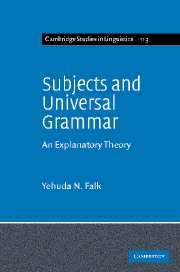2 - Most prominent argument
Published online by Cambridge University Press: 22 September 2009
Summary
Argumenthood
The subject is generally considered to be an argument. This is true in GB/MP, where the subject is characterized as the “external argument.” It is also true in RG, where the relation 1 (subject) is a Term Relation, and LFG, where subj is an argument function. In this chapter, we will examine the notion of subject as argument function. We will determine exactly what is meant by that concept, and we will see what properties follow as a result of characterizing the subject in those terms. We will also contrast the approach taken here with that of such works as Manning (1996).
First approximation
It is well established that (at least in the uniform-subject languages) there is a standard mapping from thematic roles to grammatical functions. A canonical transitive verb takes two arguments, one of which performs an action which affects the other. Semantically, following current terminology, these can be characterized as Agent and Patient. (We will say more about this in section 2.1.2.) These two semantic arguments are uniformly mapped into syntactic (grammatical) argument functions. Traditionally, the function that expresses Agents is called “subject” (subj) and the one that expresses Patients is called “object” (obj). In many languages, there can be additional Patient-like arguments realized as “secondary objects” or “restricted objects” (obj2 or objθ). Finally, additional nominal arguments are marked (generally by prepositions or Case) to indicate the thematic role explicitly; these are called obliques (oblθ).
- Type
- Chapter
- Information
- Subjects and Universal GrammarAn Explanatory Theory, pp. 30 - 72Publisher: Cambridge University PressPrint publication year: 2006



